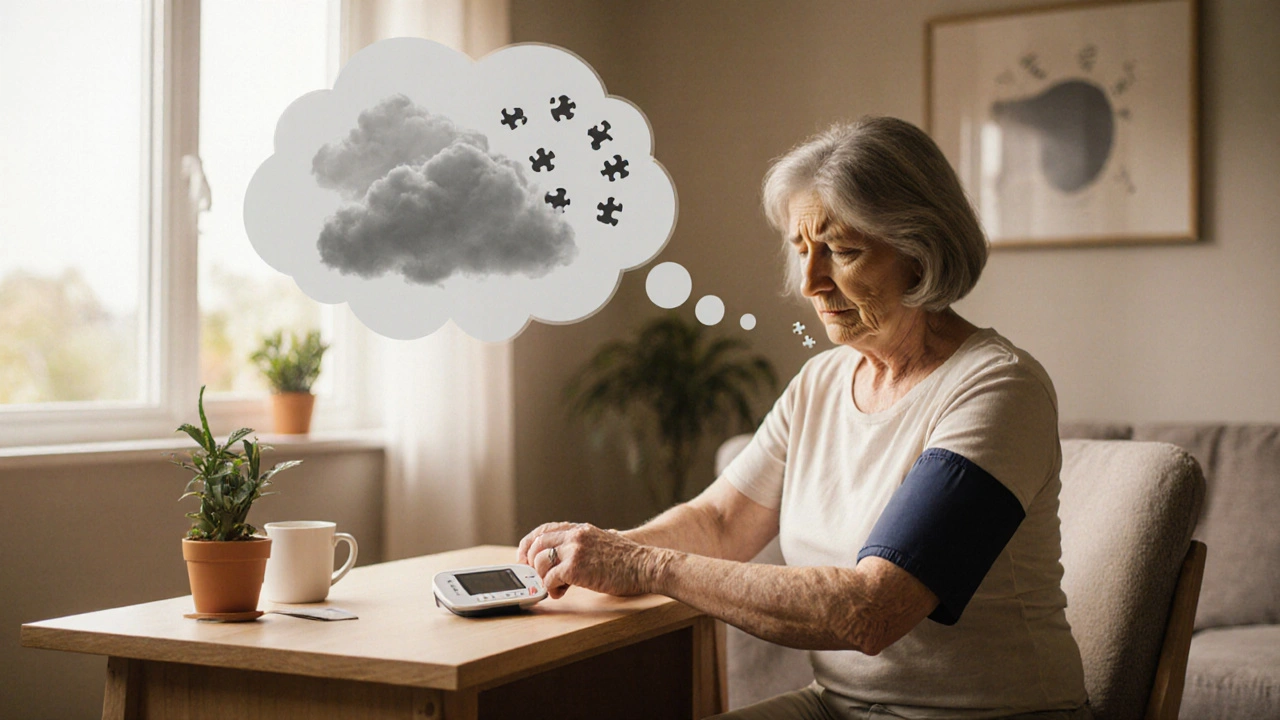Hypertension is a chronic condition characterized by consistently elevated arterial pressure-typically≥130/80mmHg. It strains the vascular system, damages organs, and is a leading driver of cardiovascular disease. While doctors often focus on heart attacks and strokes, a growing body of research shows that hypertension also reaches into the brain’s mood‑regulating circuitry, shaping mental health the psychological well‑being of an individual, including emotional, cognitive, and behavioral aspects. This article untangles that connection, highlights the most common mental‑health outcomes, and offers practical steps to protect both heart and mind.
Quick Take
- People with hypertension are 1.5‑2times more likely to develop depression.
- Elevated blood pressure raises the odds of anxiety disorders by up to 30%.
- Long‑term untreated hypertension doubles the risk of cognitive decline and dementia.
- Certain antihypertensive drugs can worsen mood, while lifestyle changes improve both BP and mood.
- Integrated screening-checking blood pressure and mental‑health symptoms together-cuts complications by 20%.
How High Blood Pressure Affects the Brain
When arteries stiffen under constant pressure, they lose the ability to buffer blood flow. This leads to cerebral microvascular damage tiny injuries to the small blood vessels in the brain that impair oxygen and nutrient delivery. Over time, the damage disrupts the prefrontal cortex and limbic system-areas that govern mood, stress response, and executive function. A 2023 meta‑analysis of 48 studies involving 250,000 adults found that each 10‑mmHg rise in systolic pressure increased the odds of depressive symptoms by 12%.
Depression and Hypertension: A Two‑Way Street
Depression isn’t just a reaction to feeling unwell; it can also raise blood pressure. Stress hormones such as cortisol cause blood vessels to constrict, nudging systolic numbers upward. Conversely, the physiological strain of hypertension fuels feelings of hopelessness and low energy, creating a vicious loop. In the Framingham Heart Study a long‑term cardiovascular cohort that began in 1948, participants with untreated hypertension were 1.8times more likely to meet criteria for major depressive disorder over a 10‑year follow‑up.
Anxiety Under Pressure
Elevated blood pressure can trigger generalized anxiety disorder a condition marked by excessive, persistent worry and physical tension. The same vascular stiffening that harms mood also amplifies the body’s fight‑or‑flight response. A 2022 Australian survey of 7,200 adults reported that 27% of people with stage2 hypertension (≥140/90mmHg) also screened positive for anxiety, compared with 14% of normotensive peers.
Cognitive Decline and Dementia Risk
Beyond mood, hypertension erodes memory and processing speed. Chronic high pressure encourages the buildup of white‑matter lesions small areas of damage in the brain’s wiring that impair communication between regions. These lesions are strongly linked to vascular dementia. A global cohort of 1.2million participants showed that mid‑life hypertension doubled the odds of developing any form of dementia later in life. Even mild cognitive impairment can manifest as “brain fog,” a symptom many hypertensive patients report.
Medication Matters: Benefits and Side Effects
Not all antihypertensive drugs are mood‑neutral. Beta‑blockers medications that reduce heart rate and contractility, commonly prescribed for high blood pressure like propranolol have been associated with increased depressive symptoms in up to 15% of users. In contrast, ACE inhibitors drugs that relax blood vessels by blocking the conversion of angiotensin I to angiotensin II may have a neutral or even protective effect on mood. A 2021 randomized trial comparing lisinopril (an ACE inhibitor) with atenolol (a beta‑blocker) found a 9% lower depression score in the lisinopril group after six months.

Lifestyle Interventions That Help Both Blood Pressure and Mood
The overlap between heart‑healthy and mind‑healthy habits is striking. Regular aerobic exercise-30minutes of moderate activity like brisk walking-lowers systolic pressure by an average of 5‑8mmHg and releases endorphins that lift mood. Mediterranean diet a eating pattern rich in fruits, vegetables, whole grains, fish, olive oil, and limited red meat reduces hypertension incidence by 30% and is linked to lower rates of depression. Stress‑reduction techniques such as mindfulness, yoga, or deep‑breathing also blunt cortisol spikes, indirectly supporting blood pressure control.
Screening and Integrated Care: What Clinicians Should Do
Given the bidirectional link, a dual‑screening protocol a clinical routine that measures blood pressure and administers a brief mental‑health questionnaire at every visit can catch issues early. Practical steps:
- Measure blood pressure in both arms; record the higher reading.
- Ask two quick questions from the PHQ‑2 ("Over the past two weeks, have you felt down or hopeless?") and GAD‑2 ("...felt nervous, anxious, or on edge?").
- If either score is ≥3, schedule a full PHQ‑9 or GAD‑7 assessment.
- Review medication list for agents with known mood side effects.
- Refer to a therapist or psychologist when depressive or anxiety symptoms exceed mild levels.
Integrated clinics that house cardiologists, primary‑care physicians, and mental‑health professionals report a 20% reduction in emergency hypertension crises and a 15% improvement in depression remission rates.
Related Concepts and Connected Topics
Understanding the hypertension‑mental‑health nexus opens doors to adjacent areas worth exploring:
- Stress management techniques aimed at reducing psychological strain and its physiological impact
- Sleep apnea a disorder where breathing repeatedly stops during sleep, raising both blood pressure and anxiety
- Cardiovascular disease a group of disorders involving the heart and blood vessels, often linked to hypertension
- Neuroinflammation inflammatory response within the brain that can be triggered by vascular dysfunction
Next‑level reading could dive into “Hypertension and Sleep Disorders” or “Medication‑Induced Mood Changes.” Each offers deeper insight into how cardiovascular health intertwines with mental well‑being.
Comparison Table: Hypertension vs. Normotension (Mental‑Health Outcomes)
| Metric | Hypertension | Normotension |
|---|---|---|
| Prevalence of depression | 22% (↑1.8‑fold vs. normotensive) | 12% |
| Prevalence of anxiety | 27% (↑1.9‑fold) | 14% |
| Incidence of cognitive decline (10‑yr) | 15 per 1,000 | 7 per 1,000 |
| Average PHQ‑9 score | 7.2±4.1 | 4.3±3.2 |
Take‑Home Checklist
- Ask patients with high blood pressure about mood and sleep quality at every visit.
- Consider switching from beta‑blockers to ACE inhibitors or ARBs if depressive symptoms emerge.
- Encourage aerobic exercise, Mediterranean‑style eating, and regular stress‑relief practices.
- Coordinate care between cardiology and mental‑health providers for comprehensive management.
Frequently Asked Questions
Can high blood pressure cause depression?
Yes. The vascular strain and chronic inflammation linked to hypertension can disrupt brain regions that regulate mood, raising the risk of depressive episodes by up to 80% compared with people who have normal blood pressure.
Do antihypertensive drugs make me anxious?
Some classes, especially beta‑blockers, have been reported to increase anxiety or cause feelings of nervousness in a minority of patients. ACE inhibitors and calcium‑channel blockers tend to have a neutral effect on anxiety.
How often should I be screened for mental‑health issues if I have hypertension?
Ideally at every routine check‑up (at least once a year). If you’re on new medication or experiencing changes in lifestyle, a brief PHQ‑2/GAD‑2 screen can be done at each visit.
Will exercising help lower my blood pressure and improve my mood?
Absolutely. Regular aerobic activity can drop systolic pressure by 5‑8mmHg and releases endorphins that combat depression and anxiety. Even 15‑minute walks, three times a week, produce measurable benefits.
Is there a safe blood‑pressure target for people with a history of depression?
Guidelines still recommend a target below 130/80mmHg for most adults, but clinicians may aim for a slightly higher range (e.g., 135/85) if aggressive lowering worsens mood or causes side‑effects. Individualization is key.

aura green
September 27, 2025 AT 20:32